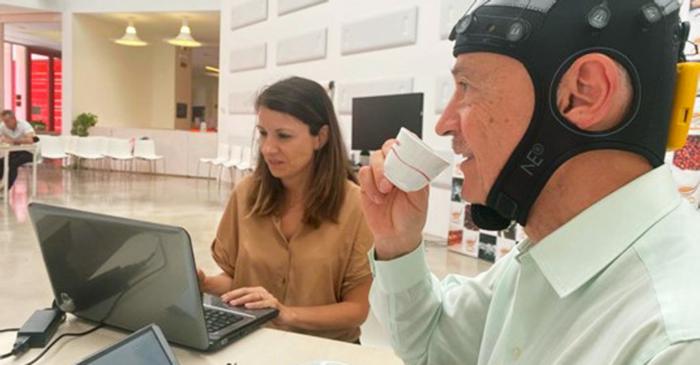Wearable tech could reveal the quality of coffee
- Like
- Digg
- Del
- Tumblr
- VKontakte
- Buffer
- Love This
- Odnoklassniki
- Meneame
- Blogger
- Amazon
- Yahoo Mail
- Gmail
- AOL
- Newsvine
- HackerNews
- Evernote
- MySpace
- Mail.ru
- Viadeo
- Line
- Comments
- Yummly
- SMS
- Viber
- Telegram
- Subscribe
- Skype
- Facebook Messenger
- Kakao
- LiveJournal
- Yammer
- Edgar
- Fintel
- Mix
- Instapaper
- Copy Link
Posted: 7 March 2024 | New Food | No comments yet
Researchers in Italy have trialled a novel form of technology which registers emotional response to coffee, which they say removes bias.


An example of panelist monitored during electroencephalogram recording at the ‘International Coffee Tasting 2022, Summer Session’, hosted at the Mumac Academy premises in Binasco, Milan, Italy, in July 2022. Credit: National Research Council of Italy
What’s the best way of telling whether the coffee is drinking is any good? Researchers in Italy have developed wearable technology to tell determine an emotional response to coffee.
Published in SCI’s Journal of the Science of Food and Agriculture, the study provides an innovative solution for reducing judgement biases that can result from traditional and more subjective methods of coffee quality assessment.
Coffee is one of the most popular and widely consumed beverages in the world, and its admirers are only growing in number. Traditionally, the assessment of coffee properties has relied on trained panellists and standardised questionnaires, leading to potential biases. However, this study claims to be the first instance in scientific literature where wearable sensors have been employed to examine the implicit emotional responses of experienced coffee judges.
“This research could open a new perspective into sensory analysis of coffee tasting,” said Lucia Billeci, a researcher at the Institute of Clinical Physiology of the National Research Council of Italy (IFC-CNR), and corresponding author of the study.
“Aside from the usual questionnaires, panellists and judges could be equipped by minimally invasive devices and can be monitored in terms of the emotions triggering physiological responses.”
To monitor physiological responses, the team equipped judges at an international coffee tasting competition in Milan, Italy, with sensors for measuring the electrical activity of the heart, brain and skin.
Alessandro Tonacci, a biomedical engineer at IFC-CNR, and lead author on the study, explained the significance of the biomedical signals measured.
“We used the electrocardiographic (ECG) signal, the Galvanic Skin Response (GSR) and the electroencephalographic signal (EEG). The ECG measures the electrical activity of the cardiac muscle and is able to provide information about the autonomic nervous system branches, which are in charge for arousal and relaxation, respectively.
“The GSR is related to the electrical activity of the human skin, correlated with emotional states, and is under direct control of the sympathetic nervous system. Finally, the EEG measures the electrical activity of the brain, measured at the scalp level, and provides information about the activation and connectivity of and between specific brain areas.”
The findings revealed significant correlations between these biomedical signals and data obtained from conventional questionnaires across all sensory domains, confirming the viability of the approach for enhancing the quality assessment of coffee.
Billeci also revealed that the results could have broader implications within the field of neuromarketing. “This approach, coupled with the ongoing advancement of artificial intelligence tools, holds the potential to guide consumers in selecting coffee blends that are more emotionally satisfying. Ultimately, it could also influence users to choose more ethical and sustainable products, while maintaining high levels of sensory satisfaction,” she said.
Related topics
Ingredients, Research & development, Technology & Innovation








